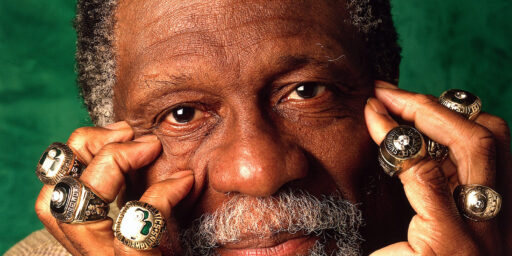Russell Simmons Returns to Def Jam Records
Hip-hop mogul Simmons returns to Def Jam (Reuters)
Entrepreneur Russell Simmons announced his return to the music business Wednesday, working with the rap label where he made his fortune. Simmons, who co-founded Def Jam Records two decades ago before selling it in 1999 for $100 million, will head up Russell Simmons Music Group.
The label is a joint venture with Island Def Jam Records, created from the merger of Island Records and Def Jam.[…]
Simmons, considered a hip-hop pioneer, started Def Jam with Rick Rubin in Rubin’s dorm room at New York University in 1984. Def Jam was the original home to some of the first mainstream rap stars: Run-DMC, the Beastie Boys and Public Enemy.
Island Def Jam is part of the Universal Music Group, part of French media conglomerate Vivendi Universal .
My familiarity with Simmons is almost entirely from his Def Comedy Jam appearances on HBO. I find it amusing, though, that Def Jam is owned by a French company.






Is that any more amusing than the fact that the same French company owns USA Network??
Vivendi, like most huge media conglomerates (e.g. News Corp. & Disney), is better thought of as post-nationalist.
I may be a couple of decades behind the times on the terminology so I need to have it explained to me. Is a “post-national” okay because its headquarters are overseas, while a “multinational” (as they were called in the ’80s) is bad because its headquarters are in the U.S., frequently Texas?
It’s so har to keep up anymore.
McGhee-
The term “post-national” in this context simply refers to the idea that corporations like Viviendi or News Corp. conceive of themselves explicitly as global concerns. They purvey in regional cultural expressions (e.g. Def Jam, Moroccan telcom, George Strait) but have no affective ties to localities.
“Multinational” assumes a nationalistic outlook and expansion outside one’s borders.
With regard to whether one is “better” than another, I was more thinking of post-national as a descriptive phrase rather than an evaluative phrase.
Just to avoid any confusion, my comment wasn’t a criticism of you or your comment, Kappiy. It’s just kind of interesting to see how all these different terms keep popping up.
For those from whom I was most accustomed to hearing the term “multinational” all those years ago, the moral connotation of a “nationalistic” outlook did seem to depend on which nation — with ours being the most likely bad guy.
Somewhere in there I’m sure somebody was also using “transnational” — maybe “post-national” has replaced it for the same meaning.
I actually don’t know about the geneology of “post-national.” It was just the first thing that came to my head!
Maybe I’m on the cutting edge in the jargon construction department?!?!?!
If the jargon is new, the concept certainly is not–Benjamin Barber’s 1994 book, “Jihad vs. McWorld,” makes the same argument regarding corporations not being concerned with nationalism (other than as a source of content).